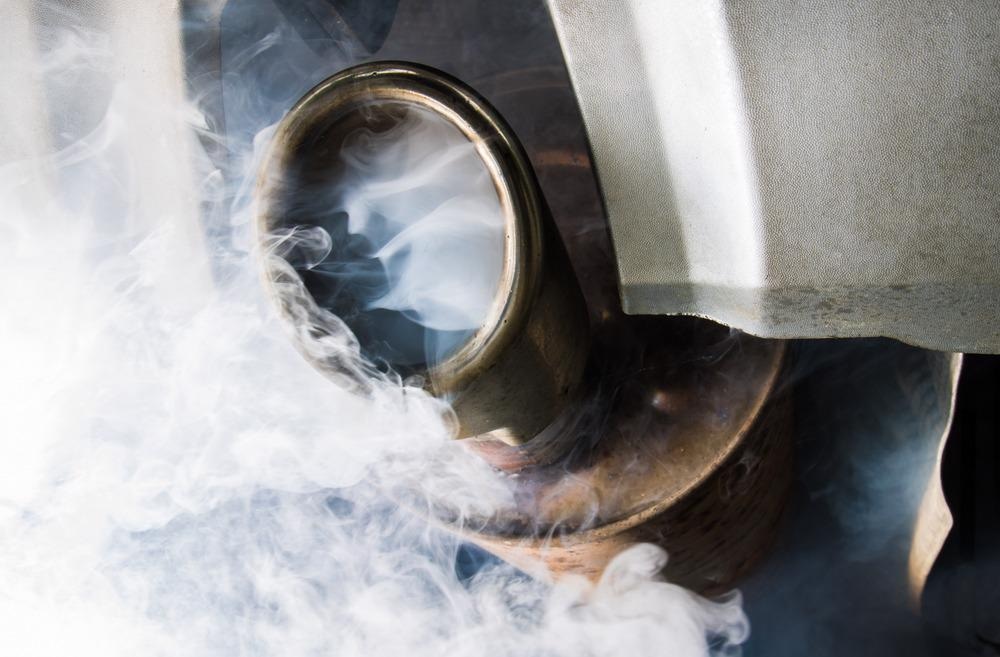Diesel’s poor emissions record has led to many people and governments choosing petrol power for personal vehicles in the last few years – despite their relative inefficiency and lower range. Modern diesel cars emit much less toxic pollution due to improved filtration methods, but nanoparticle-based additives might be the technology that keeps diesel on the road.

Image Credit: Rainer Fuhrmann/Shutterstock.com
Silicon Dioxide Nanoparticle Additives for Performance and Emissions Improvement in Diesel Engines
One example of nanoparticles tackling diesel fuel emissions was described in a recent study by engineers at the National Institute of Technology Andhra Pradesh in Tadepalligudem, India. The paper was published in the journal Silicon in 2021.
The researchers added silicon dioxide (SiO2) nanoparticles to a ternary fuel, which was a biofuel combination of 70% diesel, 20% mahua methyl ester, and 10% pentanol. They measured the emission, combustion, and performance features of the fuel when used in a common rail direct injection diesel engine.
The SiO2 nanoparticles were mixed with the diesel-based fuel in ratios of 40 parts per million (ppm), 80 ppm, and 120 ppm.
At 80 ppm, the doped diesel was found to produce 5.4% less smoke, 6.4% less hydrocarbon, and 10.2% less carbon monoxide.
Nitrous oxides (NOX) are a main cause of diesel vehicles’ declining popularity in recent years due to growing awareness of the public health risks they pose. Researchers noted a significant reduction in NOX emissions.
The team also highlighted performance improvements such as 8.8% improved brake thermal efficiency (BTE). Combined with the biomass content in the fuel, this could also reduce demand for diesel and, ultimately, oil.
Nanoparticles Are at the Cutting Edge of Diesel Fuel Emissions Research
There are many more examples of nanoparticles improving the emissions and overall performance of diesel-based fuels in the literature.
In a recent issue of Energy Reports, an international team of engineers and environmental scientists reviewed what is quite an extensive field on the influence of nanoparticles on diesel fuel emissions.
The scientists from Mekelle University in Mekelle, Ethiopia, Norwegian University of Life Sciences in Ås, Norway, and Sultan Qaboos University in Al-khod, Oman, found that most fuel properties could be enhanced with the addition of nanoparticles.
In biofuels, nanoparticle additives create steady chemical reactions that can help reduce the cost of biofuel production. They generally increase BTE in most applications, as well as reducing brake specific fuel consumption (BSFC).
Importantly, nanoparticles were consistently found to reduce exhaust emissions in terms of pollution from both toxic emissions and greenhouse gasses.
Methods for Tackling Diesel Fuel Emission with Nanoparticles
Carbon dioxide (CO2) emissions from diesel engines tend to be lower than in gasoline engines due to the leaner mechanical principles of the engineers: using a stoichiometric mixture of air and fuel to capture more of the available energy from hydrocarbon (HC) atoms in the fuel.
But oxygenating the fuel source leads to potentially toxic and generally harmful emissions such as HC, CO2, and NOX. Particulate matter also tends to be found in higher quantities in diesel emissions than gasoline, leading to respiratory problems in humans and other exposed animals.
As well as adopting the best available filtration technology, adding nanoparticle additives can alter the fuel properties so that these harmful emissions are reduced.
Biofuels like ternary diesel and biodiesel help with some of these challenges. Particulate matter decreases both in mass and number of particles in most of these alternatives, for example.
However, some challenges remain. NOX emissions actually increase in untreated biodiesel due to the increased oxygen content in the fuel.
Adding carbon nanotubes (CNTs) to biodiesel reduces NOX emissions by 9.2%, HC by 6.7%, CO2 by 5.9%, and smoke by 7.8%. These findings were observed in application in a naturally aspirated single cylinder, four stroke diesel engine ran at 1500 revolutions per minute (rpm) with varied engine loads.
Another experiment showed that adding titanium dioxide (TiO2) nanoparticles to Pongamia based biodiesel fuel at 100 ppm led to reductions in NOX, HC, CO2, and smoke emissions by 3.8%, 2.1%, 1.9%, and 2.7%, respectively.
Aluminum oxide (Al2O3) nanoparticles mixed with B20 biodiesel led to reductions in all exhaust emissions, including about 55% less HC and 75% less CO2. These significant results are attributable to improvements in mass transfer and radiation heat transfer caused by the nanoparticle treatment.
Another study found that copper oxide (CuO), rhodium oxide (Rh2O3), carbon nanotubes, aluminum carbide (Al4C3), titanium dioxide (TiO2), graphene, and ferrous liquids to regular diesel led to reductions in all exhaust emission gasses.
These results are affected by several factors other than various nanoparticles, of course. The make and model of the test engine, fuel type and concentration ratios, the engine’s operating conditions and running cycles, and the methods and instrumentation used for testing.
References and Further Reading
Bidir, M.G., et al. (2021). The role of nanoparticles on biofuel production and as an additive in ternary blend fuelled diesel engine: A review. Energy Reports. doi.org/10.1016/j.egyr.2021.05.084.
Ramachander, R., S.K. Gugulothu, and G.R.K. Sastry (2021). Performance and Emission Reduction Characteristics of Metal Based Sio2 Nanoparticle Additives Blended with Ternary Fuel (Diesel-MME-Pentanol) on CRDI Diesel Engine. Silicon. doi.org/10.1007/s12633-021-01024-4.
Selvanayagam, B.F., et al. (2022). A review on nanoparticles blended with diesel to improve combustion characteristics and reduction in emission of diesel engine. Materials Today: Proceedings. doi.org/10.1016/j.matpr.2022.04.828.
Disclaimer: The views expressed here are those of the author expressed in their private capacity and do not necessarily represent the views of AZoM.com Limited T/A AZoNetwork the owner and operator of this website. This disclaimer forms part of the Terms and conditions of use of this website.